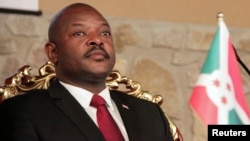Political storm clouds have been gathering over Burundi, with worries the president's ambitions for a constitutionally-questionable third term in office could reignite violence in a country still regaining its footing after years of civil war.
President Pierre Nkurunziza has faced revolt from within his own party over his presumed candidacy for the June election. Seventy-nine members of the ruling CNDD-FDD party wrote the president last week asking him not to seek office.
The influential Catholic Church in Burundi also has joined the growing chorus of civil society and opposition groups urging Mr. Nkurunziza not to run.
While the party has yet to name a candidate, the president has offered no signal he will step aside.
“You have a very wide coalition of the opponents to the third mandate,” says Thierry Vircoulon, Central Africa Director for the International Crisis Group, “and President Nkurunziza and his entourage seem to be a bit isolated.”
Nkurunziza's eligibility comes down to a legal argument over the wording of a formative peace agreement and the country's constitution.
Arusha agreement
Burundi's existing political structures were founded on the 2000 Arusha agreement which brought to an end the civil war between Hutu and Tutsi factions that killed up to 300,000 people.
That agreement says the president can serve no more than two terms in office.
But the 2005 constitution states the president must be elected through “universal direct suffrage” - interpreted to mean a popular vote. Nkurunziza was elected by parliament to his first term, so, his supporters argue, he is eligible to run again.
Whether he does so or not, Nkuruniziza's government has been under fire from rights groups and the international community for boxing out the opposition and silencing voices of dissent.
Vircoulon says the political tension in the lead-up to the election “is the conclusion of the five years of the second mandate of President Nkurunziza, that has been characterized by political intolerance and repression.”
Rights groups have accused the ruling party of arming its youth wing, known as the Imbonerakure, and using them to attack opponents in the past.
Armed groups
Human Rights Watch last month said members of the group assisted the police and military in executing 47 people following a confrontation with an unnamed armed group in northwestern Cibitoke province.
Jean-Claude Nkundwa, a peace activist in Bujumbura, fears that armed groups could be exploited to keep the president in power.
“These ongoing military activities among civilian young people have become a kind of another security forces in parallel to the legal security forces that we have,” he says.
The international community, including the United Nations, the United States and the African Union have urged Burundian political actors to respect the rule of law and hold fair elections, without much weighing into the debate about whether the president has the legal authority to run.
Nkundwa is urging foreign partners to be prepared to intervene if necessary.
“The current situation may just break all the things that we have built for 10 years,” he says. “This is where I actually personally would call the international community to get actively engaged to protect this democratic state we have achieved.”




